Step into the intriguing yet sneeze-filled realm of cat health! Today, we'll demystify a common, yet often misunderstood feline issue—Herpesviridae.
You've likely come across this term in human diseases contexts like chickenpox or shingles. But, did you know cats have a version too?
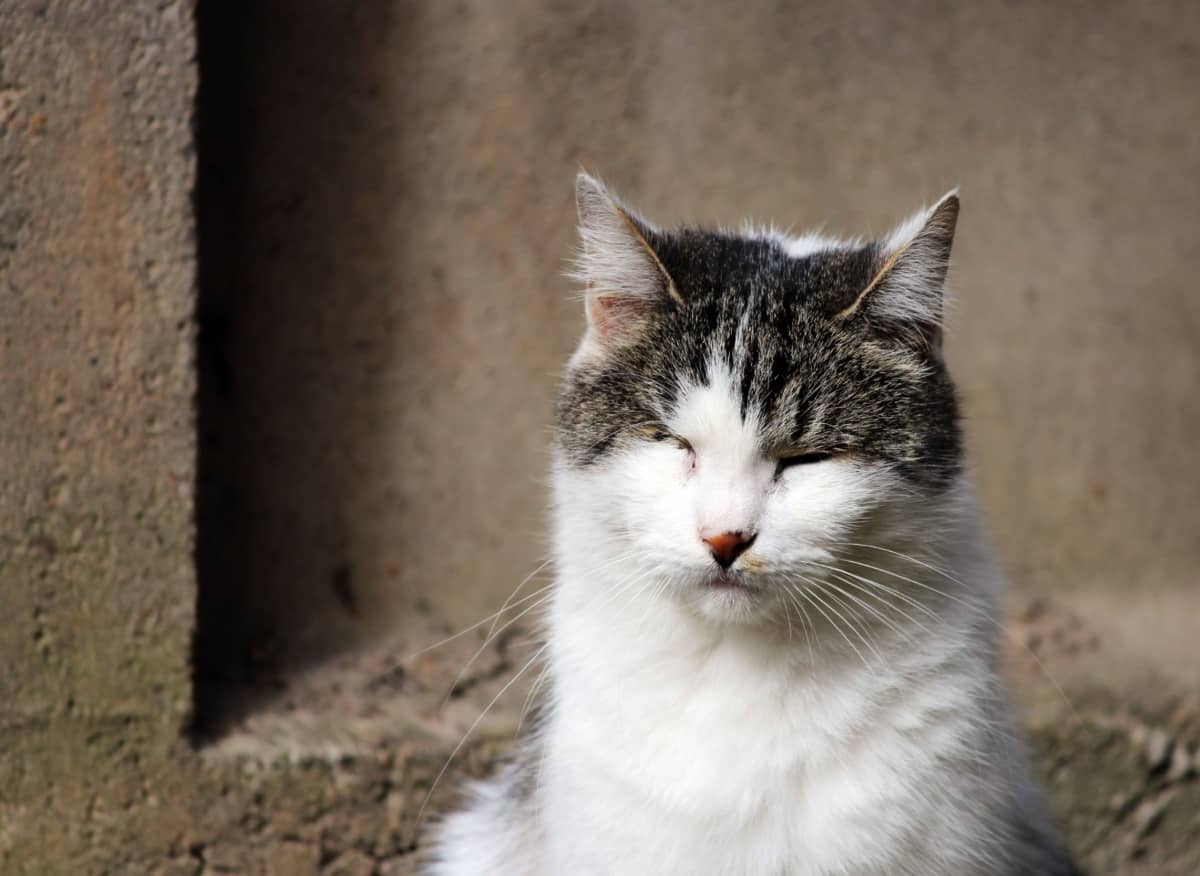
Let's focus on Feline Herpes virus Type 1 (FHV-1). It's a critical factor in feline respiratory disease, fondly known by vets as Rhinotracheitis.
This crafty intruder can trigger a range of symptoms. These could be as mild as a simple sneeze or as severe as loss of appetite and watery discharge from the eyes and nose.
But worry not! We're here to support our furry friends. Let's learn about this virus, identify its signs, and provide the best care.
Moreover, we'll explore preventive measures to safeguard our beloved whiskered pals from possible outbreaks.
Ready to become your cat's prime health partner? Let's untangle the puzzle of feline Herpes and Rhinotracheitis together!
Is Your Cat At Risk Of Feline Herpes?
The Feline Respiratory Disease complex is highly infectious, whether caused by Herpes or another virus or bacteria. It can transmit from one cat to another through direct contact or by coming in contact with eye, nose, or mouth discharge.
Infection can also spread through contaminated food dishes, litter boxes, or even your hands. Even a sneeze or cough can send tiny infectious droplets into the air.
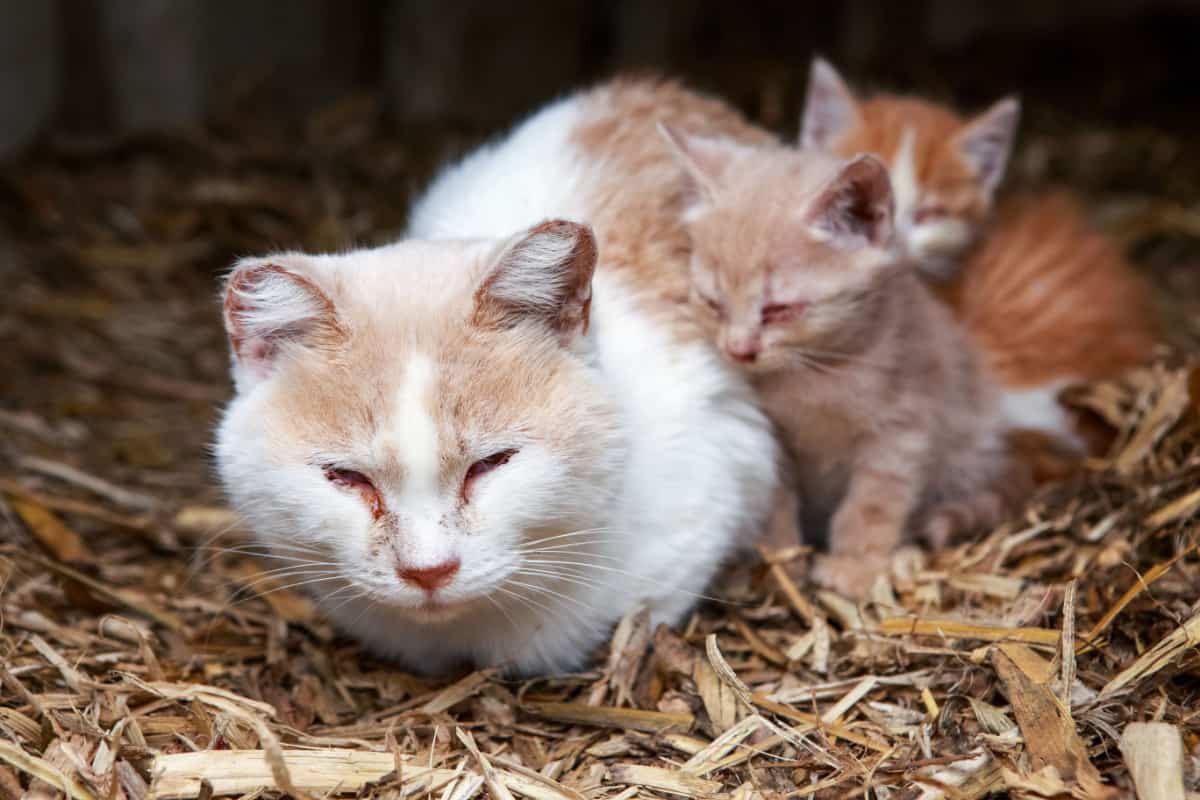
Catteries, rescue shelters, and homes with multiple cats are particularly prone to an outbreak of respiratory disease among non-vaccinated cats.
This disease can pose a significant danger to kittens, causing high death rates. For adult cats, the main risk is loss of appetite due to obstructed nasal passages, hindering their ability to smell food.
However, it's important to note that the feline respiratory disease complex isn't infectious to humans.
Detecting Feline Herpes Symptoms
Feline respiratory disease complex symptoms are similar, regardless of which virus is the cause of the infection. Severity changes from cat to cat and often changes along the course of sickness.
Some cats go through an acute stage before the disease turns into a chronic condition.
Early symptoms usually include bouts of sneezing, eye infection (conjunctivitis), and watery discharge from the nose and eyes.
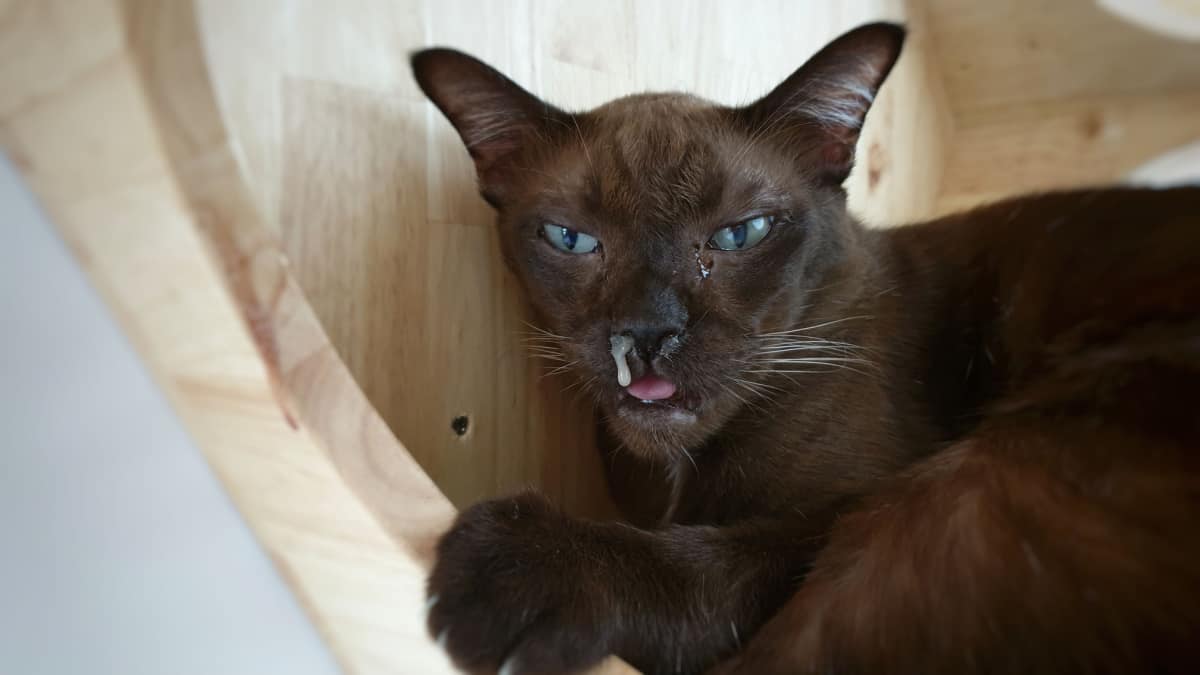
Later on, the cat may develop a fever, along with apathy and loss of appetite. This is often followed by a more severe and purulent discharge from the eyes and nose.
When herpes virus-induced Rhinotracheitis is the cause, the cat usually develops a more severe eye infection, sometimes complicated by corneal ulcerations. A spastic cough will also be added to the mix.
Once the acute phase runs its course, cats remain carriers of the herpes virus for the rest of their lives.
The infection may be reactivated when the carrier cat goes through periods of stress later on in life, inducing a mild upper respiratory infection.
SIGN UP FOR THECATSITE'S EMAIL UPDATES >
Effective Treatment For Feline Herpes
Supportive care is the key to treating this disease. The sick cat needs to be isolated and provided with rest and humidification. A cold steam vaporizer can help humidify the room and ease breathing.
The sick cat needs to be constantly monitored for signs of dehydration, and fluids should be supplemented according to your vet's recommendations.
Your cat may need to be encouraged to eat, by feeding special foods suggested as suitable by your veterinarian.
If your cat still refuses to eat, loses weight, and becomes dehydrated, seek immediate veterinarian help. In some cases, your vet may suggest antibiotics to fight off secondary bacterial infections.
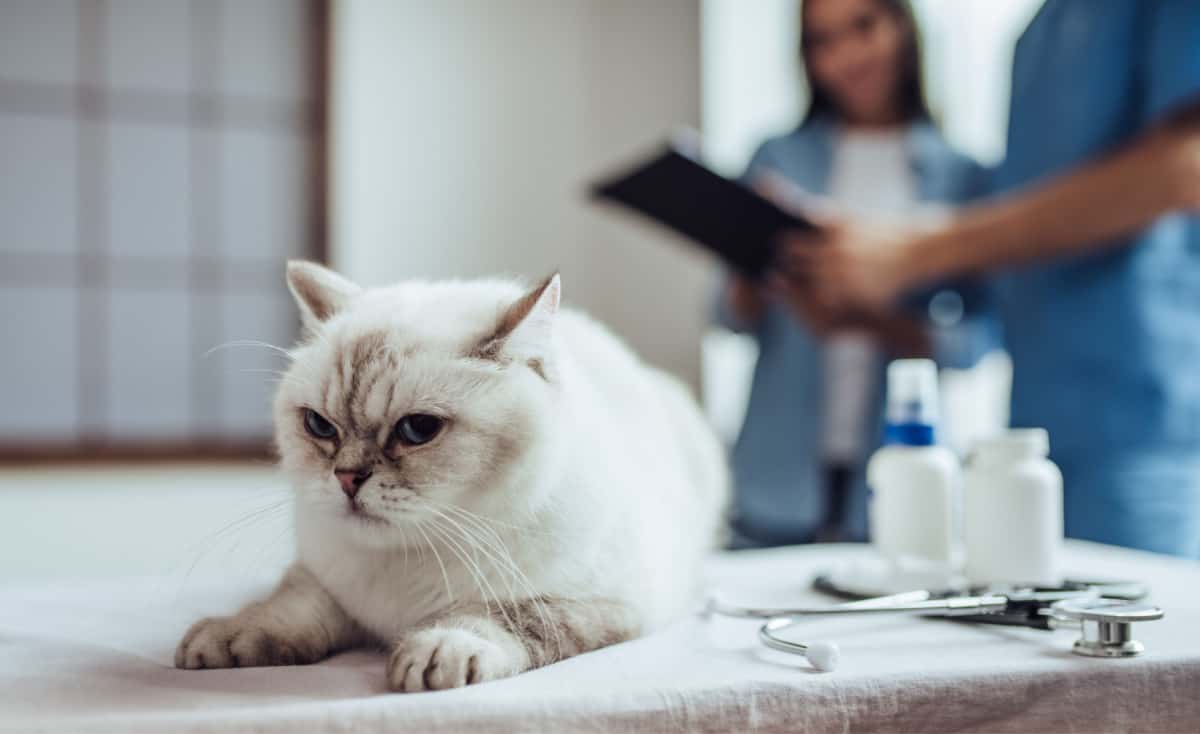
Some cat owners choose to supplement their cat's diet with the amino acid l-lysine to prevent and treat herpes outbreaks.
Recent studies showed that there is no real benefit in doing so but many of our members supplement their herpes kitties' diets with l-lysine on a regular basis.
The two supplements mentioned often are the following:
1. NOW Foods L-Lysine Powder
2. VETRISCIENCE Vetri Lysine Plus
Safeguarding Cats From Feline Herpes
Prevention is the best strategy against this infection. Regular vaccination of all cats is vital.
Extra care is necessary for breeding cats in catteries. Some vets recommend vaccinating queens before mating and giving birth to protect newborn kittens.
A routine vaccination schedule should then be followed with all kittens and cats.
Building Resilience Against Feline Herpes
Understanding, preventing, and treating feline herpes and rhinotracheitis on time are essential.
Our feline buddies depend on us for their care and protection against such infections. Regular vaccinations, clean environments, and behavior or symptom observation are crucial health measures for our cats.
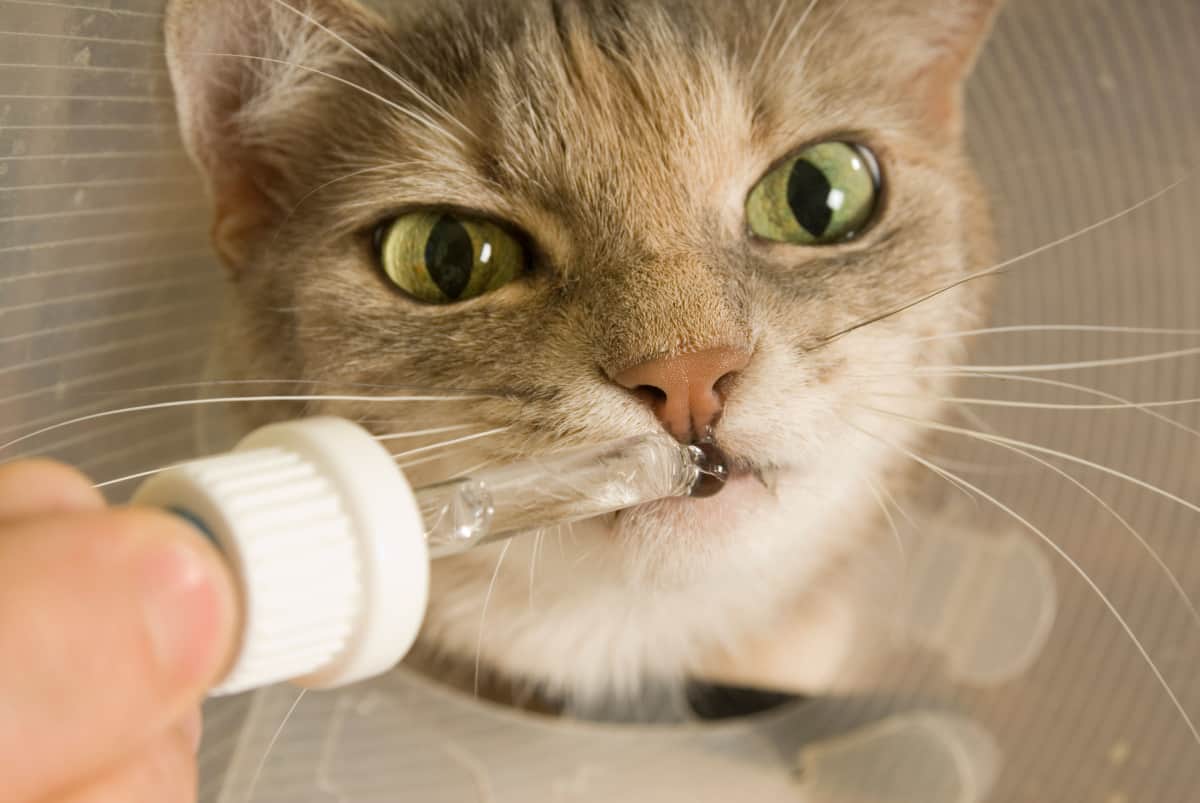
Prompt vet consultation upon symptom observation can significantly improve our pets' prognosis and life quality.
Although feline herpes causes a lifelong carrier state, proper care can enable many cats to live comfortably and healthily. Our aim isn't to completely eradicate the virus but to manage it effectively so our cats can enjoy life.
Feline Herpes - Safeguarding Your Cat's Health
We've journeyed together through the complex realm of feline health, focusing on Feline Herpes Virus Type 1, a critical component of the feline respiratory disease complex.
Feline Herpes, although common, can be misunderstood. This virus causes a spectrum of symptoms, from sneezing to severe ailments like loss of appetite and watery discharge from the eyes and nose.
Despite the lifelong carrier state, with correct management and care, cats can lead a comfortable and healthy life. The key to combatting this disease lies in early detection, understanding its symptoms, and initiating proper treatment.
Proactive steps can greatly enhance prevention, including regular vaccinations, maintaining a clean environment, and monitoring your cat's behavior and health.
The bond between cats and their caregivers strengthens in the face of feline herpes, fostering resilience and adaptability.
As we continue to be informed and proactive, we not only help our cats live healthier lives, but we also make their journey through life more vibrant and fulfilling.
SIGN UP FOR THECATSITE'S EMAIL UPDATES >
Comments? Leave them using the comment section below. Questions? Please use the cat forums for those!
For more cat health-related topics, check out the articles below.
Note: We may get commissions for purchases made through links on this page.



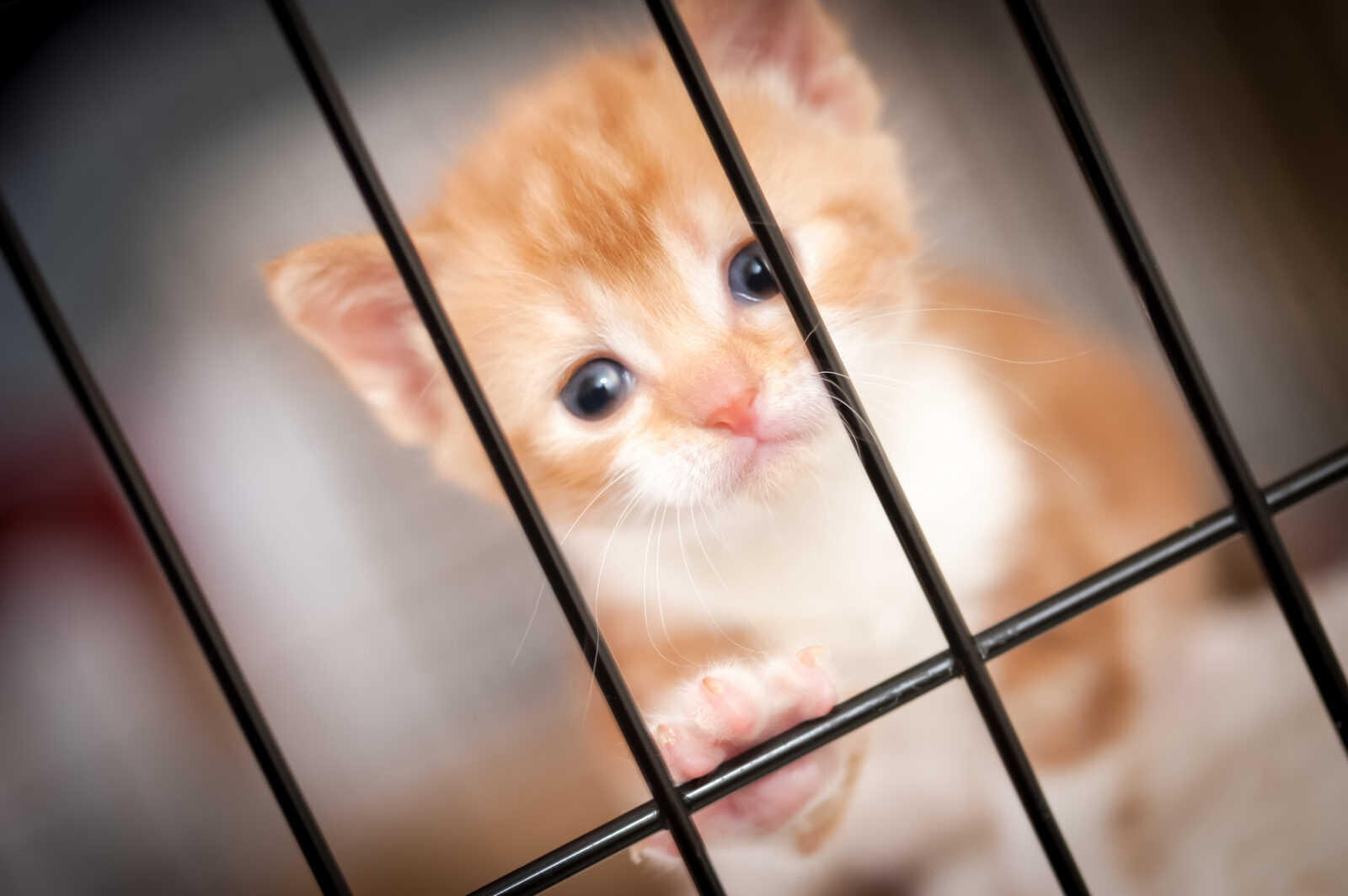
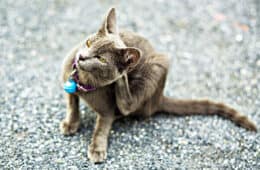

12 comments on “Feline Herpes And Rhinotracheitis – Expert Advice For Cat Owners”